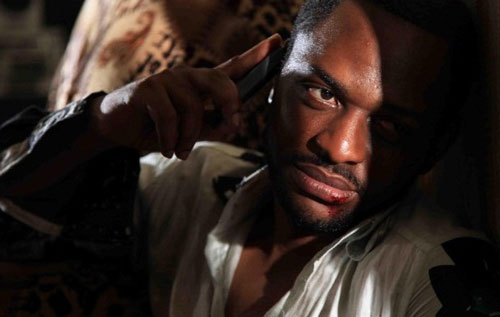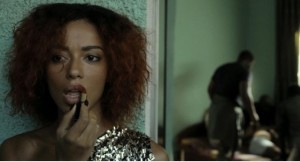
“Money is like poison. At the very end, it always kills you,” a gangster’s flame-haired moll tells the antihero of Congolese flick Viva Riva! It’s a brief flicker of trite morality in an otherwise unashamedly blood-soaked and sex-stained film set in Kinshasa where everybody seems to be on the take or on the make.
Viva Riva! is the first feature film to come out of the Democratic Republic of Congo (DRC) in nearly 25 years and it has enjoyed enthusiastic reviews on the film festival and arthouse circuits around the world. Roger Ebert of the Chicago Times, for example, awarded the film three and a half stars (out of four) and tagged it as “a slick, exciting, well-made crime thriller, dripping with atmosphere”.
Viva Riva! struggles to shoulder the weight of the hype on its shoulders, but it is nonetheless a promising debut for Congolese director Djo Tunda Wa Munga. He has set out to make a film that plays out a hardboiled crime story with Congolese characters and settings, and nails this target with technical precision.

Viva Riva! is set in a Kinshasa during a petrol drought that has left the whole city thirsting for fuel. For most, this is an additional hardship to bear in one of the poorest cities in the world, but for small-time hustler Riva it is an opportunity to get rich quickly. Riva has come into a consignment of petrol that he plans to sell for US$6, $8, even $10 a litre.
The only problem is that everyone in town wants to get their hands on the fuel, including the urbane but ruthless Angolan crime lord Riva stole it from in the first place. Riva’s life becomes even more complicated when he falls for the stunning girlfriend of a Kinshasa crime kingpin.
In stark outline, Viva Riva! isn’t dissimilar to hundreds of other films about lowlifes and criminals double-crossing and back-stabbing each other. It is the sense of place — “Kinshasa the beautiful, Kinshasa the garbage” as one character puts it — that separates the film from the many European and American movies that follow the same template.
Viva Riva! trailer (via YouTube):
http://www.youtube.com/watch?v=j8GGI1lwgkk
Antoine Roch’s gritty cinematography captures the squalor and grime of the streets nestling against ill-gotten wealth as it tracks the action from nightclubs and bordellos to truck stops and gangster’s pimped-out pads. Within this world, the fuel isn’t just a MacGuffin, but a metaphor for the way that the fight for mineral resources has torn countries like the DRC apart.
This landscape is populated by fascinating characters — thugs, whores, conmen, corrupt priests and cops — none of them good, some of them outright evil, and most of them just trying to survive in a difficult city.
Riva isn’t a particularly noble character, but he is played with roguish charm by Patsha Bay. He spends money as quickly as he gets it and his only goal in becoming rich is to have the means to enjoy nightclubs, champagne and fast women.
Manie Malone’s Nora is an entrancing combination of vulnerability and treachery — a woman, who as Ebert says, “likes [Riva] well enough. She also likes staying alive.” As César, Hoji Fortuna creates a villain whose heartlessness makes the blood run cold.
Some detractors of the film say that its brutal murders, filthy streets and pungent brothel scenes play to negative stereotypes of Africa — a charge that Munga seems understandably impatient with (see YouTube video below). After all, we don’t all judge the US by Martin Scorsese’s Mean Streets and Taxi Driver. We accept that there is normality alongside the violence and squalor the cinema shows.
Where did the stifling and condescending notion that African filmmakers should only work in the worthy idiom of social realism come from in the first place? Look in the subtext and a film as pulpy as Viva Riva! has some intriguing commentary to offer on the environment where it was created.
As compelling as the setting and the characters are, Viva Riva! falls down on its pacing and plotting. The editing feels a bit choppy, with some scenes of boring exposition and other passages where events clip past before you have time to take them in. That criticism aside, Viva Riva! is a lurid, cynical and entertaining slice of African cinema. — Lance Harris, TechCentral
- Read more: Djo Tunda Wa Munga interview at The Guardian
- Subscribe to our free daily newsletter
- Follow us on Twitter or on Facebook




